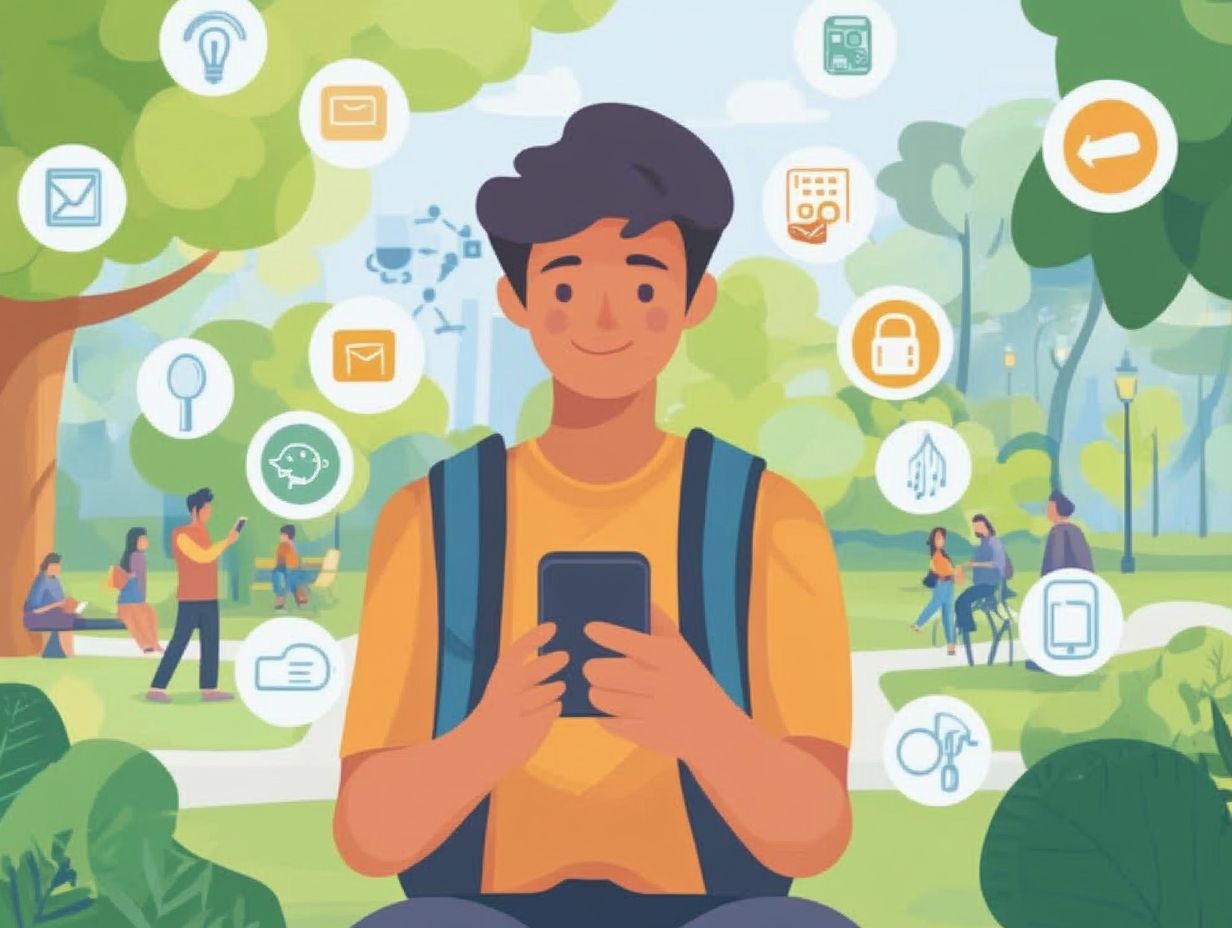the rise of mobile apps for language learning courses
In recent years, you ve likely noticed a dramatic transformation in the landscape of language learning, shifting away from traditional classroom methods and embracing the dynamic realm of mobile technology.
As smartphones have become ubiquitous, language learning apps are redefining how you acquire new languages. This article delves into the evolution of language learning, showcasing the numerous benefits of mobile apps, including unmatched convenience and engaging features that keep you motivated.
You ll discover top apps, gain insights on effective learning strategies, and explore future trends in this exhilarating field. Join in as you navigate this new era of language acquisition and unlock your linguistic potential!
Contents
Key Takeaways:

Mobile apps have revolutionized the way we learn languages, providing convenience and flexibility for learners. These apps offer interactive and engaging learning experiences through features like games, quizzes, and real-time feedback. When choosing a language learning app, consider factors like your learning style, budget, and user reviews to find the right fit for you.
The Evolution of Language Learning
The journey of language learning has experienced a stunning transformation, shifting from traditional methods to the dynamic landscape of modern technology. This evolution mirrors your changing needs and preferences as a language learner in our increasingly digital world.
As educators adapt to these advancements, the integration of innovative tools and techniques has redefined how you acquire language skills, making the process more engaging and effective. This fascinating evolution is well-documented in academic research, which delves into the effectiveness of various teaching methods and the profound impact of technology on language acquisition.
Traditional Methods vs. Modern Technology
Traditional methods of language teaching, like rote memorization and grammar drills, often fall short in providing the interactive experience that modern technology offers. This lack of engagement hinders your communication skills and overall language proficiency.
On the other hand, learning apps transform how you approach acquiring a new language. Tools such as Duolingo and Babbel provide personalized lessons designed for various skill levels, making your language learning journey far more engaging.
These applications incorporate gamified elements, reward systems, and instant feedback, which not only keep you motivated but also give you the opportunity to practice real-world conversations in a risk-free environment.
Consequently, many learners discover that their language skills improve more swiftly compared to traditional methods, benefiting from a dynamic blend of education and technology that caters to their individual learning styles.
The Benefits of Mobile Apps for Language Learning

Mobile apps have transformed the language learning landscape, offering you unique benefits. They give you the power to enhance your language skills at your own pace, helping you engage better and creating a truly personalized learning experience.
With their innovative gamified features, these apps take the often intimidating journey of mastering a new language into an enjoyable adventure. You’ll find yourself breaking down language barriers and embracing consistent practice with ease and excitement.
Convenience and Flexibility
The convenience and flexibility of mobile apps make them the perfect companion for your language learning journey, allowing you to access courses anytime and anywhere from your mobile device.
This modern approach empowers you to enrich your language skills during those fleeting moments throughout the day whether you’re commuting on public transport, waiting in line, or enjoying a well-deserved break at work.
By transforming idle time into productive practice, you can engage with interactive exercises, listen to audio tutorials, or dive into language challenges. Practicing on-the-go not only enhances your retention but also keeps your motivation soaring, as you can track your progress and celebrate your achievements regularly.
Ultimately, integrating language learning into your daily routine paves the way for you to achieve fluency goals more efficiently and effectively.
Interactive and Engaging Learning Experience
An interactive and engaging learning experience is essential for effective language acquisition. Mobile apps excel at creating this dynamic environment for you.
By incorporating features like quizzes that make testing your knowledge enjoyable and audio-visual content that brings words to life, these applications create an engaging environment tailored to your learning needs.
Social engagement tools help you connect with peers, fostering a sense of community and shared objectives.
These interactive elements boost your motivation and enhance retention rates, transforming the learning process into something enjoyable and effective.
A well-designed app caters to various learning styles, ensuring you stay invested in your language journey and driving your success forward.
Top Mobile Apps for Language Learning

In the competitive landscape of the language learning market, several mobile apps stand out as frontrunners.
Duolingo, Babbel, Memrise, Pimsleur, and Rosetta Stone each bring unique features thoughtfully designed to cater to the diverse needs of language learners like you.
Features and Reviews
The features of leading language learning apps, combined with user feedback, significantly influence their effectiveness and popularity among learners like you.
Many users love the game-like aspects of these apps, making the learning experience enjoyable and engaging.
Features such as point systems, leaderboards, and challenges motivate consistent practice and lead to higher retention rates.
Don t miss out! Take advantage of free trials to explore app features before you subscribe, a crucial consideration for many.
Research shows that 90% of users believe these apps enhance their language acquisition process, with many reporting substantial improvements in their conversational skills within just a few months of use.
How to Choose the Right App for You
Selecting the right language learning app can profoundly influence your path to fluency.
Understanding the key factors to consider is essential as you navigate the many options available today.
Factors to Consider

When selecting a language learning app, consider factors like your current proficiency level, the vocabulary you want to master, and your long-term language aspirations.
Explore the app’s features, such as interactive exercises, multimedia resources, and game-like elements that can enhance your learning experience.
Compatibility with your unique learning style whether you’re a visual, auditory, or kinesthetic learner can dramatically influence how well you retain information and enjoy the process.
Gathering feedback from native speakers can offer invaluable insights into the app’s effectiveness for real-world communication.
By evaluating the offerings and capabilities of each option, you can make a well-informed choice that aligns with your goals and preferences.
Tips for Maximizing Your Language Learning with Apps
To truly elevate your language learning experience with mobile apps, employing effective strategies and techniques is essential.
This commitment will propel you toward your fluency goals and enrich your overall language acquisition journey.
Effective Strategies and Techniques
Effective strategies and techniques are vital for enhancing your cognitive skills, reading comprehension, and listening abilities while using apps.
Incorporating methods like spaced repetition allows you to revisit vocabulary and grammar rules, reinforcing your memory over time.
Immersive learning experiences such as engaging with native speakers or consuming media in your target language greatly enhance your understanding and contextual usage.
Participating in practical exercises that involve writing, speaking, and listening activates multiple senses, creating a dynamic learning environment for you.
These combined approaches promote better retention and lead to a deeper mastery of the language, allowing you to communicate with greater effectiveness and confidence.
Future of Language Learning with Mobile Apps
The future of language learning is here! Mobile apps hold remarkable potential, especially with AI integration on the horizon. Market growth could revolutionize how you engage with different languages.
This evolution promises to enhance your learning experience in ways previously unimagined.
Predictions and Trends
Trends in the language learning market indicate a compelling shift towards personalized educational tools. These tools enhance user engagement and cater to your individual learning style.
The growing integration of artificial intelligence fuels this evolution. Apps can now customize lessons and feedback based on your unique pace and skill level.
Interactive learning methods, such as using game-like elements to make learning more fun, multimedia resources, and real-time feedback, are essential for keeping you motivated!
As a result, the demand for diverse language offerings is on the rise. This includes not only major world languages but also regional dialects and lesser-studied tongues.
For educators, these shifts represent an exciting opportunity to adopt adaptive teaching strategies. They can now effectively meet the varied needs of their students.
Frequently Asked Questions
What are language learning apps?
Language learning apps are tools that let you learn on-the-go with fun lessons, quizzes, and tracking features!
Why the rise in mobile language learning?
The rise of mobile apps can be attributed to the widespread use of smartphones and tablets. Technological advancements also make learning convenient and accessible.
What are the advantages of using language learning apps?
Mobile apps offer flexibility in learning, personalized study plans, engaging lessons, and the ability to track your progress! They re also often more affordable than traditional courses.
Are there downsides to using language learning apps?
Some apps may not offer comprehensive instruction or may not suit advanced learners. Additionally, some users find it challenging to stay motivated when learning solely through an app.
What languages can I learn through these apps?
A wide range of languages are available, from popular ones like Spanish and French to lesser-studied languages. Research and compare different apps to find the one that fits your needs!
Can language learning apps replace traditional classes?
While they are helpful tools, apps cannot fully replace traditional classes. They might lack human interaction and real-life practice, so a combination of both methods is best for a well-rounded experience.
Explore the language learning revolution today! Embrace the flexibility and excitement that language learning apps provide!




